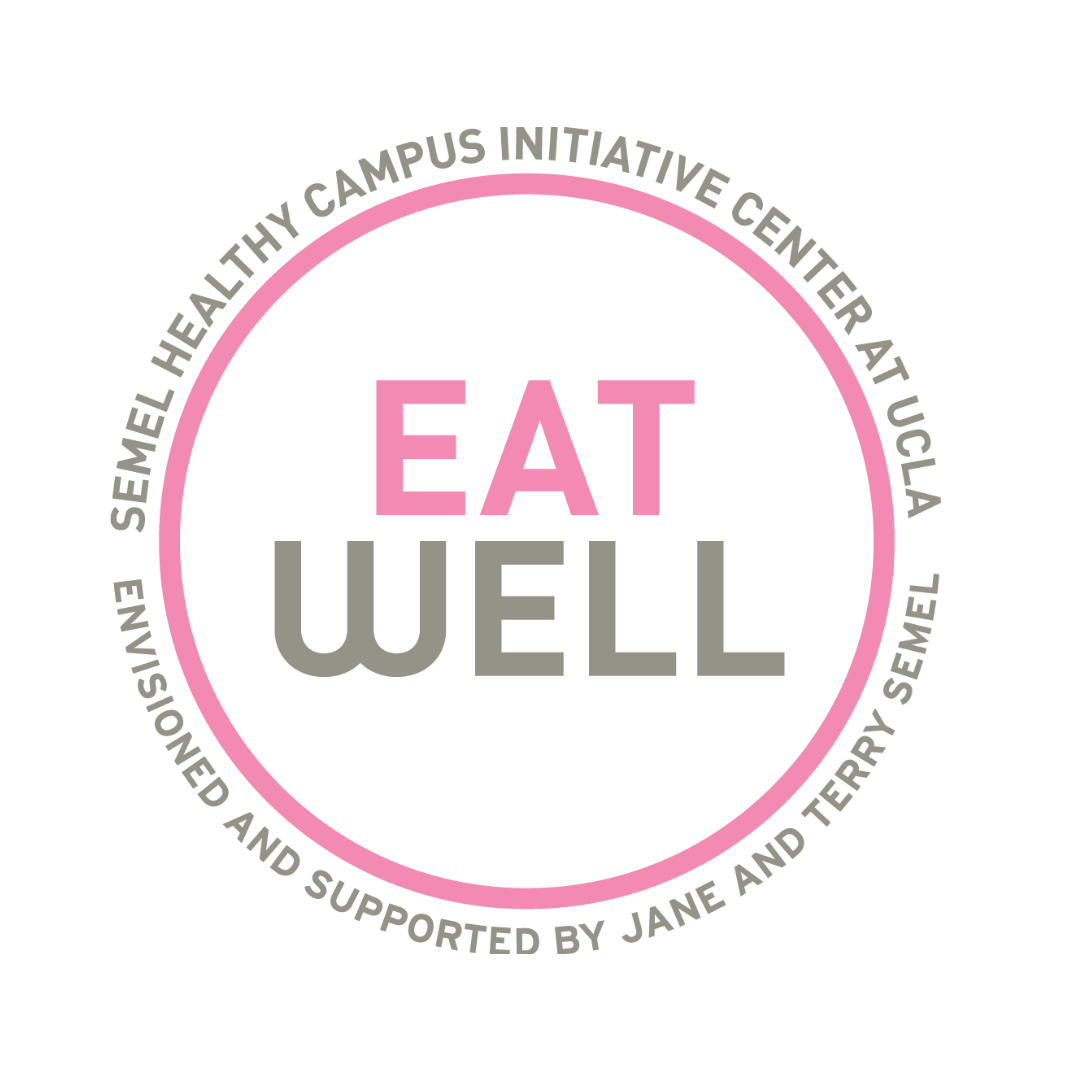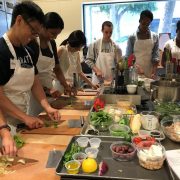More than Cooking: UCLA Teaching Kitchen Offers Students the Chance to Learn, Connect, and Get Comfortable with Food
“Give a man a fish and you feed him for a day; teach a man to fish, and you feed him for a lifetime.” – Anne Isabella Ritchie
These words perfectly encapsulate the UCLA Teaching Kitchen. Having recently completed the second iteration of a new pilot program with a group of health professional graduate students from Dentistry, Medicine, Nursing, and Public Health, the UCLA Teaching Kitchen has now taught nearly 50 students “how to fish.”
UCLA Teaching Kitchen Program for Health Professional Students
Launched in Spring 2017, with support from the UCLA Healthy Campus Initiative and David Geffen School of Medicine, the UCLA Teaching Kitchen is part of the national Teaching Kitchen Collaborative, which promotes teaching kitchens as “catalysts of enhanced personal and public health across medical, corporate, school, and community settings.”
At UCLA, the program was developed for our unique mix of health professional students. Modeled after classes developed by dietitian Dolores Hernandez of UCLA Dining, two UCLA dietitians, Janet Leader of the Fielding School of Public Health, and Kaitlin Reid of UCLA Student Health Education & Promotion, adapted and further developed the original curriculum with help from medical student Stephanie Gall. This collaboration resulted in a three-class series: Egg-cellent breakfast, Healthy Lunches on the Go, and Freshly Bowled —which aim to help students gain knowledge and skills in the following areas: cooking on a budget; creating quick, easy, and healthy meals/snacks; stocking a kitchen; preventing chronic disease and promoting healthy lifestyles/weight maintenance; kitchen and food safety; and knife skills.
The hands-on, experiential classes are held at Sur La Table in Westwood and led by a chef, alongside dietitians Leader and Reid. Under their guidance, students work in interdisciplinary groups to create recipes from scratch—chopping, stirring, tasting, salting, and building as they go. Between recipes and while enjoying their creations, students learn from Leader and Reid about the nutrient composition of various foods, healthy fats, building healthy meals, reducing sodium, eating mindfully, creating a healthier relationship with food, reading nutrition labels, benefits of fiber, and more.
Program Impact
With support from EatWell’s Hannah Malan and Miranda Westfall, both doctoral students in the Fielding School of Public Health, the program is undergoing an IRB-approved evaluation to assess its effectiveness in achieving desired changes in participants’ knowledge, attitudes, and behavior. So far, preliminary findings show positive results, with students reporting improved nutrition knowledge and confidence in knife skills, incorporating fruits and vegetables into meals, preparing meals on a budget, and advising clients about food and cooking. In addition, students report enjoying the social connectedness that comes from cooking together.
Food is communal and cooking can be therapeutic. During classes, students connect to peers, laugh, eat, and learn together. It’s a chance for them to escape the academic rigor of their respective graduate programs. Research done right here on campus suggests cooking classes are a possible solution to address the stress and challenges around food that many students experience. This kind of practical training offers an opportunity for students to develop skills they can use in both their personal and professional lives. In fact, between classes many students report they tried to make at least one of the class recipes at home and some students already used what they learned to educate patients in community settings.
Cooking Classes Growing on Campus
Cooking classes and demonstrations on campus, while few in numbers, are not new. Just last January, UCLA Dining offered weekend cooking classes in one of the dining hall kitchens and had over 600 students sign up. The UCLA Teaching Kitchen has seen similar numbers, with over 400 health professional graduate students signing up to take part in the pilot program. And while the program can’t support that amount of interest yet, the program leaders have every intention to one day support that number.
UCLA faculty and staff from all over campus have also come out to observe class. The dean from each health professional school, in addition to David Baron, the Senior Executive Director of the Ashe Student Health and Wellness Center, and Wendy Slusser, the Associate Vice Provost of the Healthy Campus Initiative, along with physicians from the UCLA Department of Integrative Medicine have been among the guests.
Following the completion of this successful pilot program, the UCLA Teaching Kitchen leadership is exploring ways to expand the program to serve students throughout the campus community. We have applied for additional funding to give more students the opportunity to take a basic nutrition and cooking classes during their time at UCLA and hope to eventually reach all who are interested. One day, you may be among those who learned “how to fish.” In the meantime, if you’re interested in having a go in the kitchen yourself, try this simple recipe from class or take a look at this website to explore numerous ways to become more comfortable with food preparation.
Breakfast Burrito
Serves 4
- 6 large eggs
- 1/2 cup whole milk
- 1 tablespoon unsalted butter
- ½ small red onion, cut into a ¼ inch dice
- 1 red bell pepper, cut into a ¼ inch dice
- 1 cup canned black beans, rinsed and strained
- ¼ cup salsa
- Salt and pepper
- 4 (10-inch) whole wheat flour tortillas
- 1 cup shredded Jack cheese
Place the eggs and milk in a medium bowl and whisk until completely combined. Melt the butter in a large sauté pan over medium-low heat and sauté onions and bell peppers until soft, then add the beans and eggs. Cook for 3 minutes, stirring frequently with a silicone spatula. Place the tortillas in the microwave and cook on high for 10-20 seconds or warm in a separate sauté pan.
Place a tortilla in the center of each plate and spoon the eggs down the middle of each tortilla. Sprinkle the cheese over the eggs and fold the sides of the tortillas over the eggs to close. Turn the burritos seam side down and add your favorite toppings.
By: Kaitlin Reid, MPH, RDN, CHES; Nutrition Health Educator, UCLA Student Health Education & Promotion


